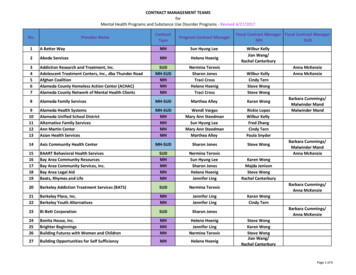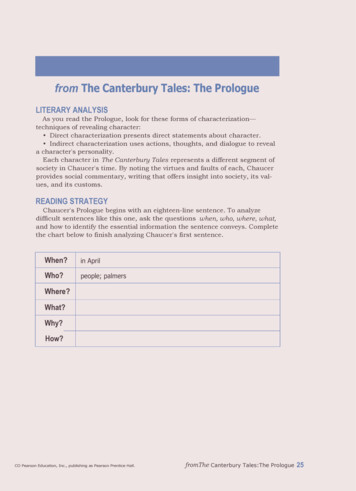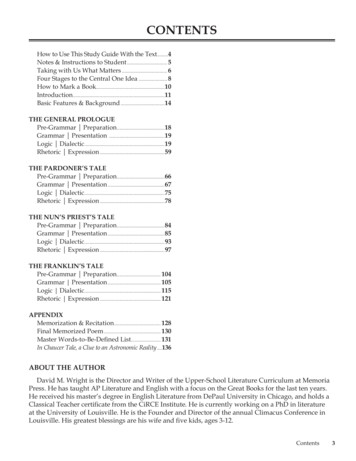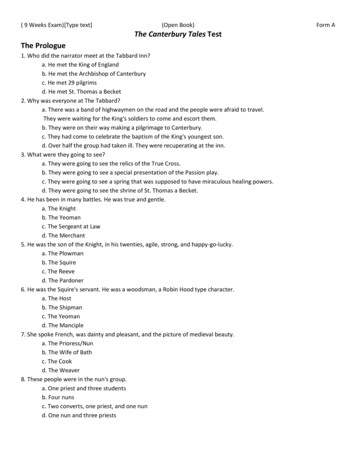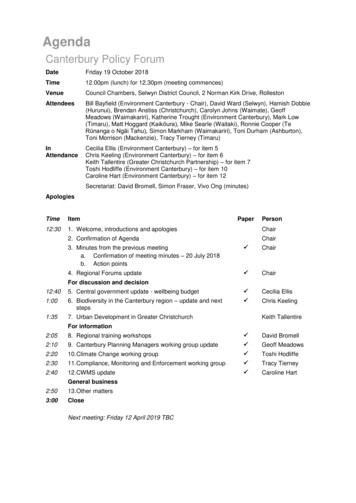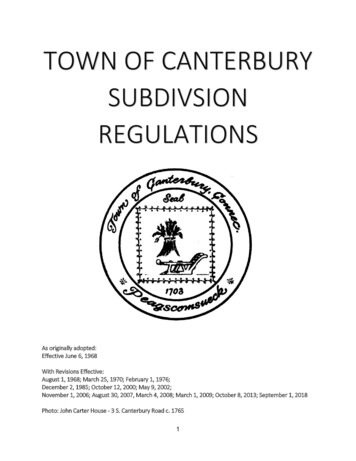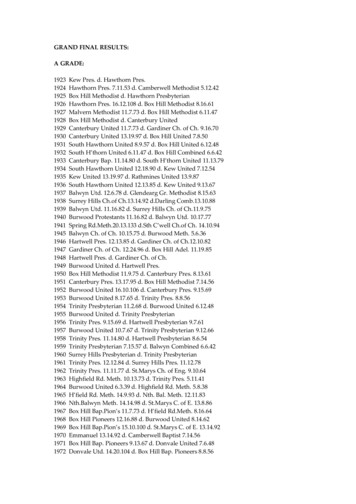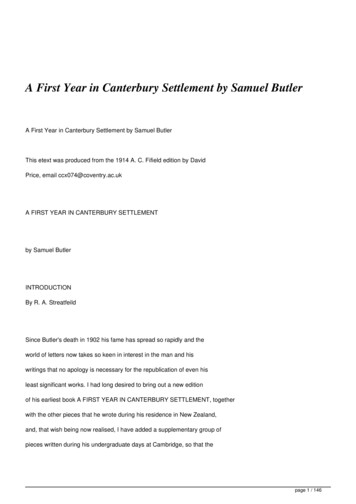
Transcription
A First Year in Canterbury Settlement by Samuel ButlerA First Year in Canterbury Settlement by Samuel ButlerThis etext was produced from the 1914 A. C. Fifield edition by DavidPrice, email ccx074@coventry.ac.ukA FIRST YEAR IN CANTERBURY SETTLEMENTby Samuel ButlerINTRODUCTIONBy R. A. StreatfeildSince Butler's death in 1902 his fame has spread so rapidly and theworld of letters now takes so keen in interest in the man and hiswritings that no apology is necessary for the republication of even hisleast significant works. I had long desired to bring out a new editionof his earliest book A FIRST YEAR IN CANTERBURY SETTLEMENT, togetherwith the other pieces that he wrote during his residence in New Zealand,and, that wish being now realised, I have added a supplementary group ofpieces written during his undergraduate days at Cambridge, so that thepage 1 / 146
present volume forms a tolerably complete record of Butler's literaryactivity up to the days of EREWHON, the only omission of any importancebeing that of his pamphlet, published anonymously in 1865, THE EVIDENCEFOR THE RESURRECTION OF JESUS CHRIST AS CONTAINED IN THE FOUREVANGELISTS CRITICALLY EXAMINED. I have not reprinted this, becausepractically the whole of it was incorporated into THE FAIR HAVEN.A FIRST YEAR IN CANTERBURY SETTLEMENT has long been out of print, andcopies of the original edition are difficult to procure. Butlerprofessed to think poorly of it. Writing in 1889 to his friend AlfredMarks, who had picked up a second-hand copy and felt some doubt as toits authorship, he said: "I am afraid the little book you have referredto was written by me. My people edited my letters home. I did notwrite freely to them, of course, because they were my people. If I wasat all freer anywhere they cut it out before printing it; besides, I hadnot yet shed my Cambridge skin and its trail is everywhere, I am afraid,perceptible. I have never read the book myself. I dipped into a fewpages when they sent it to me in New Zealand, but saw 'prig' writtenupon them so plainly that I read no more and never have and never meanto. I am told the book sells for 1 pound a copy in New Zealand; infact, last autumn I know Sir Walter Buller gave that for a copy inEngland, so as a speculation it is worth 2s. 6d. or 3s. I stole apassage or two from it for EREWHON, meaning to let it go and never bereprinted during my lifetime."This must be taken with a grain of salt. It was Butler's habitsometimes to entertain his friends and himself by speaking of his ownpage 2 / 146
works with studied disrespect, as when, with reference to his own DARWINAND THE ORIGIN OF SPECIES, which also is reprinted in this volume, hedescribed philosophical dialogues as "the most offensive form, exceptpoetry and books of travel into supposed unknown countries, that evenliterature can assume." The circumstances which led to A FIRST YEARbeing written have been fully described by Mr. Festing Jones in hissketch of Butler's life prefixed to THE HUMOUR OF HOMER (Fifield,London, 1913, Kennerley, New York), and I will only briefly recapitulatethem. Butler left England for New Zealand in September, 1859, remainingin the colony until 1864. A FIRST YEAR was published in 1863 inButler's name by his father, who contributed a short preface, statingthat the book was compiled from his son's journal and letters, withextracts from two papers contributed to THE EAGLE, the magazine of St.John's College, Cambridge. These two papers had appeared in 1861 in theform of three articles entitled "Our Emigrant" and signed "Cellarius."By comparing these articles with the book as published by Butler'sfather it is possible to arrive at some conclusion as to the amount ofediting to which Butler's prose was submitted. Some passages in thearticles do not appear in the book at all; others appear unaltered;others again have been slightly doctored, apparently with the object ofrobbing them of a certain youthful "cocksureness," which probably gratedupon the paternal nerves, but seems to me to create an atmosphere of anengaging freshness which I miss in the edited version. So much of the"Our Emigrant" articles is repeated in A FIRST YEAR almost if not quiteverbatim that it did not seem worth while to reprint the articles intheir entirety. I have, however, included in this collection oneextract from the latter which was not incorporated into A FIRST YEAR,though it describes at greater length an incident referred to on p. 74.page 3 / 146
From this extract, which I have called "Crossing the Rangitata," readerswill be able to see for themselves how fresh and spirited Butler'soriginal descriptions of his adventures were, and will probably regretthat he did not take the publication of A FIRST YEAR into his own hands,instead of allowing his father to have a hand in it.With regard to the other pieces included in this volume {1} I havethought it best to prefix brief notes, when necessary, to each in turnexplaining the circumstances in which they were written and, when it waspossible, giving the date of composition.In preparing the book for publication I have been materially helped byfriends in both hemispheres. My thanks are specially due to MissColborne-Veel, of Christ-church, N.Z., for copying some of Butler'searly contributions to THE PRESS, and in particular for her kindness inallowing me to make use of her notes on "The English Cricketers"; to Mr.A. T. Bartholomew for his courtesy in allowing me to reprint his articleon "Butler and the Simeonites," which originally appeared in THECAMBRIDGE MAGAZINE of 1 March, 1913, and throws so interesting a lightupon a certain passage in THE WAY OF ALL FLESH. The article is herereprinted by the kind permission of the editor and proprietor of THECAMBRIDGE MAGAZINE; to Mr. J. F. Harris for his generous assistance intracing and copying several of Butler's early contributions to THEEAGLE; to Mr. W. H. Triggs, the editor of THE PRESS, for allowing me tomake use of much interesting matter relating to Butler that has appearedin the columns of that journal; and lastly to Mr. Henry Festing Jones,whose help and counsel have been as invaluable to me in preparing thispage 4 / 146
volume for the Press as they have been in past years in the case of theother books by Butler that I have been privileged to edit.R. A. STREATFEILD.PREFACE[By the Rev. Thomas Butler]The writer of the following pages, having resolved on emigrating to NewZealand, took his passage in the ill-fated ship Burmah, which neverreached her destination, and is believed to have perished with all onboard. His berth was chosen, and the passage-money paid, when importantalterations were made in the arrangements of the vessel, in order tomake room for some stock which was being sent out to the CanterburySettlement.The space left for the accommodation of the passengers being thuscurtailed, and the comforts of the voyage seeming likely to be muchdiminished, the writer was most providentially induced to change hisship, and, a few weeks later, secured a berth in another vessel.The work is compiled from the actual letters and journal of a youngemigrant, with extracts from two papers contributed by him to the Eagle,a periodical issued by some of the members of St. John's College,Cambridge, at which the writer took his degree. This variety in thepage 5 / 146
sources from which the materials are put together must be the apologyfor some defects in their connection and coherence. It is hoped alsothat the circumstances of bodily fatigue and actual difficulty underwhich they were often written, will excuse many faults of style.For whatever of presumption may appear in giving this little book to thepublic, the friends of the writer alone are answerable. It was at theirwish only that he consented to its being printed. It is, however,submitted to the reader, in the hope that the unbiassed impressions ofcolonial life, as they fell freshly on a young mind, may not be whollydevoid of interest. Its value to his friends at home is not diminishedby the fact that the MS., having been sent out to New Zealand forrevision, was, on its return, lost in the Colombo, and was fished upfrom the Indian Ocean so nearly washed out as to have been with somedifficulty deciphered.It should be further stated, for the encouragement of those who think offollowing the example of the author, and emigrating to the samesettlement, that his most recent letters indicate that he has no reasonto regret the step that he has taken, and that the results of hisundertaking have hitherto fully justified his expectations.LANGAR RECTORYJune 29, 1863CHAPTER Ipage 6 / 146
Embarkation at Gravesend--Arrest of Passenger--Tilbury Fort--Deal--Bayof Biscay Gale--Becalmed off Teneriffe--Fire in the Galley--Trade Winds-Belt of Calms--Death on Board--Shark--Current--S. E. Trade Winds-Temperature--Birds--Southern Cross--Cyclone.It is a windy, rainy day--cold withal; a little boat is putting off fromthe pier at Gravesend, and making for a ship that is lying moored in themiddle of the river; therein are some half-dozen passengers and a lot ofheterogeneous-looking luggage; among the passengers, and the owner ofsome of the most heterogeneous of the heterogeneous luggage, is myself.The ship is an emigrant ship, and I am one of the emigrants.On having clambered over the ship's side and found myself on deck, I wassomewhat taken aback with the apparently inextricable confusion ofeverything on board; the slush upon the decks, the crying, the kissing,the mustering of the passengers, the stowing away of baggage still leftupon the decks, the rain and the gloomy sky created a kind of halfamusing, half-distressing bewilderment, which I could plainly see to beparticipated in by most of the other landsmen on board. Honest countryagriculturists and their wives were looking as though they wondered whatit would end in; some were sitting on their boxes and making a show ofreading tracts which were being presented to them by a serious-lookinggentleman in a white tie; but all day long they had perused the firstpage only, at least I saw none turn over the second.page 7 / 146
And so the afternoon wore on, wet, cold, and comfortless--no dinnerserved on account of the general confusion. The emigration commissionerwas taking a final survey of the ship and shaking hands with this, that,and the other of the passengers. Fresh arrivals kept continuallycreating a little additional excitement--these were saloon passengers,who alone were permitted to join the ship at Gravesend. By and by acouple of policemen made their appearance and arrested one of the party,a London cabman, for debt. He had a large family, and a subscriptionwas soon started to pay the sum he owed. Subsequently, a much largersubscription would have been made in order to have him taken away byanybody or anything.Little by little the confusion subsided. The emigration commissionerleft; at six we were at last allowed some victuals. Unpacking my booksand arranging them in my cabin filled up the remainder of the evening,save the time devoted to a couple of meditative pipes. The emigrantswent to bed, and when, at about ten o'clock, I went up for a little timeupon the poop, I heard no sound save the clanging of the clocks from thevarious churches of Gravesend, the pattering of rain upon the decks, andthe rushing of the river as it gurgled against the ship's side.Early next morning the cocks began to crow vociferously. We had aboutsixty couple of the oldest inhabitants of the hen-roost on board, whichwere intended for the consumption of the saloon passengers--a destinywhich they have since fulfilled: young fowls die on shipboard, only oldones standing the weather about the line. Besides this, the pigs beganpage 8 / 146
grunting and the sheep gave vent to an occasional feeble bleat, the onlyexpression of surprise or discontent which I heard them utter during theremainder of their existence, for now, alas! they are no more. Iremember dreaming I was in a farmyard, and woke as soon as it was light.Rising immediately, I went on deck and found the morning calm and sulky-no rain, but everything very wet and very grey. There was TilburyFort, so different from Stanfield's dashing picture. There wasGravesend, which but a year before I had passed on my way to Antwerpwith so little notion that I should ever leave it thus. Musing in thisway, and taking a last look at the green fields of old England, soakingwith rain, and comfortless though they then looked, I soon became awarethat we had weighed anchor, and that a small steam-tug which had beengetting her steam up for some little time had already begun to subtracta mite of the distance between ourselves and New Zealand. And so, earlyin the morning of Saturday, October 1, 1859, we started on our voyage.The river widened out hour by hour. Soon our little steam-tug left us.A fair wind sprung up, and at two o'clock, or thereabouts, we foundourselves off Ramsgate. Here we anchored and waited till the tide,early next morning. This took us to Deal, off which we again remained awhole day. On Monday morning we weighed anchor, and since then we havehad it on the forecastle, and trust we may have no further occasion forit until we arrive at New Zealand.I will not waste time and space by describing the horrible sea-sicknessof most of the passengers, a misery which I did not myself experience,nor yet will I prolong the narrative of our voyage down the Channel--itpage 9 / 146
was short and eventless. The captain says there is more danger betweenGravesend and the Start Point (where we lost sight of land) than all theway between there and New Zealand. Fogs are so frequent and collisionsoccur so often. Our own passage was free from adventure. In the Bay ofBiscay the water assumed a blue hue of almost incredible depth; there,moreover, we had our first touch of a gale--not that it deserved to becalled a gale in comparison with what we have since experienced, stillwe learnt what double-reefs meant. After this the wind fell very light,and continued so for a few days. On referring to my diary, I perceivethat on the 10th of October we had only got as far south as the fortyfirst parallel of latitude, and late on that night a heavy squall comingup from the S.W. brought a foul wind with it. It soon freshened, and bytwo o'clock in the morning the noise of the flapping sails, as the menwere reefing them, and of the wind roaring through the rigging, wasdeafening. All next day we lay hove to under a close-reefed maintopsail, which, being interpreted, means that the only sail set was themain-topsail, and that that was close reefed; moreover, that the shipwas laid at right angles to the wind and the yards braced sharp up.Thus a ship drifts very slowly, and remains steadier than she wouldotherwise; she ships few or no seas, and, though she rolls a good deal,is much more easy and safe than when running at all near the wind. Nextday we drifted due north, and on the third day, the fury of the galehaving somewhat moderated, we resumed--not our course, but a course onlyfour points off it. The next several days we were baffled by foulwinds, jammed down on the coast of Portugal; and then we had anothergale from the south, not such a one as the last, but still enough todrive us many miles out of our course; and then it fell calm, which wasalmost worse, for when the wind fell the sea rose, and we were tossedpage 10 / 146
about in such a manner as would have forbidden even Morpheus himself tosleep. And so we crawled on till, on the morning of the 24th ofOctober, by which time, if we had had anything like luck, we should havebeen close on the line, we found ourselves about thirty miles from thePeak of Teneriffe, becalmed. This was a long way out of our course,which lay three or four degrees to the westward at the very least; butthe sight of the Peak was a great treat, almost compensating for pastmisfortunes. The Island of Teneriffe lies in latitude 28 degrees,longitude 16 degrees. It is about sixty miles long; towards thesouthern extremity the Peak towers upwards to a height of 12,300 feet,far above the other land of the island, though that too is very elevatedand rugged. Our telescopes revealed serrated gullies upon the mountainsides, and showed us the fastnesses of the island in a manner that madeus long to explore them. We deceived ourselves with the hope that somespeculative fisherman might come out to us with oranges and grapes forsale. He would have realised a handsome sum if he had, butunfortunately none was aware of the advantages offered, and so we lookedand longed in vain. The other islands were Palma, Gomera, and Ferro,all of them lofty, especially Palma--all of them beautiful. On theseaboard of Palma we could detect houses innumerable; it seemed to bevery thickly inhabited and carefully cultivated. The calm continuingthree days, we took stock of the islands pretty minutely, clear as theywere, and rarely obscured even by a passing cloud; the weather wasblazing hot, but beneath the awning it was very delicious; a calm,however, is a monotonous thing even when an island like Teneriffe is inview, and we soon tired both of it and of the gambols of the blackfish(a species of whale), and the operations on board an American vesselhard by.page 11 / 146
On the evening of the third day a light air sprung up, and we watchedthe islands gradually retire into the distance. Next morning they werefaint and shrunken, and by midday they were gone. The wind was thecommencement of the north-east trades. On the next day (Thursday,October 27, lat. 27 degrees 40 minutes) the cook was boiling some fat ina large saucepan, when the bottom burnt through and the fat fell outover the fire, got lighted, and then ran about the whole galley, blazingand flaming as though it would set the place on fire, whereat an alarmof fire was raised, the effect of which was electrical: there was noreal danger about the affair, for a fire is easily extinguishable on aship when only above board; it is when it breaks out in the hold, isunperceived, gains strength, and finally bursts its prison, that itbecomes a serious matter to extinguish it. This was quenched in fiveminutes, but the faces of the female steerage passengers were awful. Inoticed about many a peculiar contraction and elevation of one eyebrow,which I had never seen before on the living human face, though often inpictures. I don't mean to say that all the faces of all the saloonpassengers were void of any emotion whatever.The trades carried us down to latitude 9 degrees. They were but lightwhile they lasted, and left us soon. There is no wind more agreeablethan the N.E. trades. The sun keeps the air deliciously warm, thebreeze deliciously fresh. The vessel sits bolt upright, steering aS.S.W. course, with the wind nearly aft: she glides along with scarcelyany perceptible motion; sometimes, in the cabin, one would fancy onemust be on dry land. The sky is of a greyish blue, and the sea silverpage 12 / 146
grey, with a very slight haze round the horizon. The water is verysmooth, even with a wind which would elsewhere raise a considerable sea.In latitude 19 degrees, longitude 25 degrees, we first fell in withflying fish. These are usually in flocks, and are seen in greatestabundance in the morning; they fly a great way and very well, not withthe kind of jump which a fish takes when springing out of the water, butwith a bona fide flight, sometimes close to the water, sometimes somefeet above it. One flew on board, and measured roughly eighteen inchesbetween the tips of its wings. On Saturday, November 5, the trades leftus suddenly after a thunder-storm, which gave us an opportunity ofseeing chain lightning, which I only remember to have seen once inEngland. As soon as the storm was over, we perceived that the wind wasgone, and knew that we had entered that unhappy region of calms whichextends over a belt of some five degrees rather to the north of theline.We knew that the weather about the line was often calm, but had picturedto ourselves a gorgeous sun, golden sunsets, cloudless sky, and sea ofthe deepest blue. On the contrary, such weather is never known there,or only by mistake. It is a gloomy region. Sombre sky and sombre sea.Large cauliflower-headed masses of dazzling cumulus tower in front of abackground of lavender-coloured satin. There are clouds of every shapeand size. The sails idly flap as the sea rises and falls with a heavyregular but windless swell. Creaking yards and groaning rudder seem tolament that they cannot get on. The horizon is hard and black, savewhen blent softly into the sky upon one quarter or another by a rapidlyapproaching squall. A puff of wind--"Square the yards!"--the shippage 13 / 146
steers again; another--she moves slowly onward; it blows--she slipsthrough the water; it blows hard--she runs very hard--she flies; a dropof rain--the wind lulls; three or four more of the size of half a crown-it falls very light; it rains hard, and then the wind is dead--whereonthe rain comes down in a torrent which those must see who would believe.The air is so highly charged with moisture that any damp thing remainsdamp and any dry thing dampens: the decks are always wet. Mouldsprings up anywhere, even on the very boots which one is wearing; theatmosphere is like that of a vapour bath, and the dense clouds seem toward off the light, but not the heat, of the sun. The dreary monotonyof such weather affects the spirits of all, and even the health of some.One poor girl who had long been consumptive, but who apparently hadrallied much during the voyage, seemed to give way suddenly as soon aswe had been a day in this belt of calms, and four days after, we loweredher over the ship's side into the deep.One day we had a little excitement in capturing a shark, whosetriangular black fin had been veering about above water for some time ata little distance from the ship. I will not detail a process that hasso often been described, but will content myself with saying that he didnot die unavenged, inasmuch as he administered a series of cuffs andblows to anyone that was near him which would have done credit to aprize-fighter, and several of the men got severe handling or, I shouldrather say, "tailing" from him. He was accompanied by two beautifullystriped pilot fish--the never-failing attendants of the shark.One day during this calm we fell in with a current, when the aspect ofpage 14 / 146
the sea was completely changed. It resembled a furiously rushing river,and had the sound belonging to a strong stream, only much intensified;the waves, too, tossed up their heads perpendicularly into the air;whilst the empty flour-casks drifted ahead of us and to one side. Itwas impossible to look at the sea without noticing its very singularappearance. Soon a wind springing up raised the waves and obliteratedthe more manifest features of the current, but for two or three daysafterwards we could perceive it more or less. There is always at thistime of year a strong westerly set here. The wind was the commencementof the S.E. trades, and was welcomed by all with the greatest pleasure.In two days more we reached the line.We crossed the line far too much to the west, in longitude 31 degrees 6minutes, after a very long passage of nearly seven weeks, such as ourcaptain says he never remembers to have made; fine winds, however, nowbegan to favour us, and in another week we got out of the tropics,having had the sun vertically overhead, so as to have no shadow, on thepreceding day. Strange to say, the weather was never at alloppressively hot after latitude 2 degrees north, or thereabouts. A finewind, or indeed a light wind, at sea removes all unpleasant heat even ofthe hottest and most perpendicular sun. The only time that we sufferedany inconvenience at all from heat was during the belt of calms; whenthe sun was vertically over our heads it felt no hotter than on anordinary summer day. Immediately, however, upon leaving the tropics thecold increased sensibly, and in latitude 27 degrees 8 minutes I findthat I was not warm once all day. Since then we have none of us everbeen warm, save when taking exercise or in bed; when the thermometer waspage 15 / 146
up at 50 degrees we thought it very high and called it warm. The reasonof the much greater cold of the southern than of the northern hemisphereis that the former contains so much less land. I have not seen thethermometer below 42 degrees in my cabin, but am sure that outside ithas often been very much lower. We almost all got chilblains, andwondered much what the winter of this hemisphere must be like if thiswas its summer: I believe, however, that as soon as we get off thecoast of Australia, which I hope we may do in a couple of days, we shallfeel a very sensible rise in the thermometer at once. Had we known whatwas coming, we should have prepared better against it, but we were mostof us under the impression that it would be warm summer weather all theway. No doubt we felt it more than we should otherwise on account ofour having so lately crossed the line.The great feature of the southern seas is the multitude of birds whichinhabit it. Huge albatrosses, molimorks (a smaller albatross), Capehens, Cape pigeons, parsons, boobies, whale birds, mutton birds, andmany more, wheel continually about the ship's stern, sometimes indozens, sometimes in scores, always in considerable numbers. If aperson takes two pieces of pork and ties them together, leaving perhapsa yard of string between the two pieces, and then throws them into thesea, one albatross will catch hold of one end, and another of the other,each bolts his own end and then tugs and fights with his rival till oneor other has to disgorge his prize; we have not, however, succeeded incatching any, neither have we tried the above experiment ourselves.Albatrosses are not white; they are grey, or brown with a white streakdown the back, and spreading a little into the wings. The under part ofpage 16 / 146
the bird is a bluish-white. They remain without moving the wing alonger time than any bird that I have ever seen, but some suppose thateach individual feather is vibrated rapidly, though in very small space,without any motion being imparted to the main pinions of the wing. I aminformed that there is a strong muscle attached to each of the largeplumes in their wings. It certainly is strange how so large a birdshould be able to travel so far and so fast without any motion of thewing. Albatrosses are often entirely brown, but farther south, and whenold, I am told, they become sometimes quite white. The stars of thesouthern hemisphere are lauded by some: I cannot see that they surpassor equal those of the northern. Some, of course, are the same. Thesouthern cross is a very great delusion. It isn't a cross. It is akite, a kite upside down, an irregular kite upside down, with only threerespectable stars and one very poor and very much out of place. Nearit, however, is a truly mysterious and interesting object called thecoal sack: it is a black patch in the sky distinctly darker than allthe rest of the heavens. No star shines through it. The proper namefor it is the black Magellan cloud.We reached the Cape, passing about six degrees south of it, in twentyfive days after crossing the line, a very fair passage; and since theCape we have done well until a week ago, when, after a series of veryfine runs, and during as fair a breeze as one would wish to see, we weresome of us astonished to see the captain giving orders to reef topsails.The royals were stowed, so were the top-gallant-sails, topsails closereefed, mainsail reefed, and just at 10.45 p.m., as I was going to bed,I heard the captain give the order to take a reef in the foresail andpage 17 / 146
furl the mainsail; but before I was in bed a quarter of an hourafterwards, a blast of wind came up like a wall, and all night it blew aregular hurricane. The glass, which had dropped very fast all day, andfallen lower than the captain had ever seen it in the southernhemisphere, had given him warning what was coming, and he had preparedfor it. That night we ran away before the wind to the north, next daywe lay hove-to till evening, and two days afterwards the gale wasrepeated, but with still greater violence. The captain was all readyfor it, and a ship, if she is a good sea-boat, may laugh at any winds orany waves provided she be prepared. The danger is when a ship has gotall sail set and one of these bursts of wind is shot out at her; thenher masts go overboard in no time. Sailors generally estimate a gale ofwind by the amount of damage it does, if they don't lose a mast or gettheir bulwarks washed away, or at any rate carry away a few sails, theydon't call it a gale, but a stiff breeze; if, however, they are caughteven by comparatively a very inferior squall, and lose something, theycall it a gale.The captain assured us that the sea never assumes a much grander or moreimposing aspect than that which it wore on this occasion. He called meto look at it between two and three in the morning when it was at itsworst; it was certainly very grand, and made a tremendous noise, and thewind would scarcely let one stand, and made such a roaring in therigging as I never heard, but there was not that terrific appearancethat I had expected. It didn't suggest any ideas to one's mind aboutthe possibility of anything happening to one. It was excessivelyunpleasant to be rolled hither and thither, and I never felt the forcepage 18 / 146
of gravity such a nuisance before; one's soup at dinner would face oneat an angle of 45 degrees with the horizon, it would look as thoughimmovable on a steep inclined plane, and it required the nicest handlingto keep the plane truly horizontal. So with one's tea, which wouldalternately rush forward to be drunk and fly as though one were aTantalus; so with all one's goods, which would be seized with
sketch of Butler's life prefixed to THE HUMOUR OF HOMER (Fifield, London, 1913, Kennerley, New York), and I will only briefly recapitulate them. Butler left England for New Zealand in September, 1859, remaining in the colony until 1864. A FIRST YEAR was published in 1863 in Butler's name by his father, who contributed a short preface, stating
